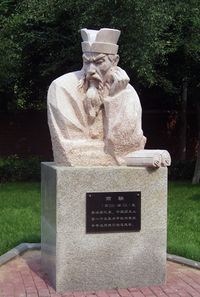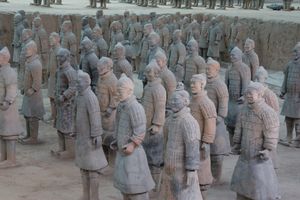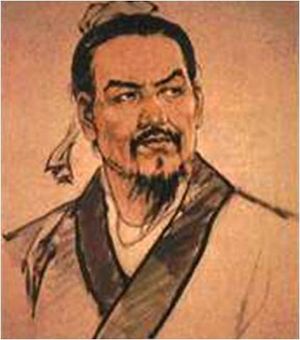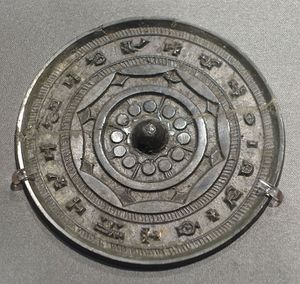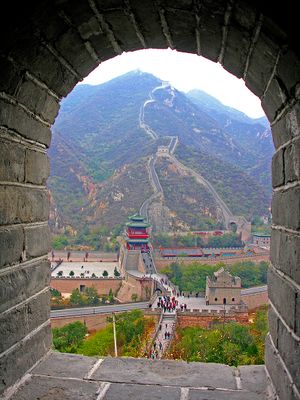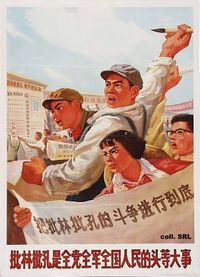الشرعوية (فلسفة صينية)
| ||||||||||||||||||||||||||||||||||||
| ||||||||||||||||||||||||||||||||||||
| ||||||||||||||||||||||||||||||||||||
Fǎ-Jiā (法家) or Legalism is one of the six classical schools of thought in Chinese philosophy that developed during the Warring States period. Grouping thinkers with an overriding concern for political reform, the Fa-Jia were crucial in laying the "intellectual and ideological foundations of the traditional Chinese bureaucratic empire",[4] and remain highly influential in administration, policy and legal practice in China today.[5] Largely ignoring morality or questions on how a society ideally should function, they examined contemporary government, emphasizing secretive administration[6] and a realistic consolidation of the wealth and power of autocrat and state, with the goal of achieving increased order, security and stability.[7]
الشرعوية (Legalism) هي الاتباع الحرفي للقانون أو للبيروقراطية دون أدنى تفكير أو منطق (عن الجمعية الدولية للمترجمين العرب).
الشيء الوحيد الذي عكر صفو هذه الإصلاحات هو الطريقة الاستبدادية والشمولية التي نشرت بها الدولة فلسفتها الرسمية الشرعوية. ففي عام 213 ق.م. تم حرق كل كتب المدارس الفلسفية الأخرى، فقط الكتب التي كانت تضمها المكتبة الإمبراطورية استبقي عليها، تم دفن الآلاف من رجال العلم وهم أحياء بسبب آرائهم، وأجبر البعض الآخر على الأعمال الشاقة، كان "شي هوانگ دي" بحاجة إلى كل اليد العاملة المتوفرة حتى يبنى السور العظيم، ويحمي الحدود الشمالية لإمبراطوريته.
خلفية تاريخية
الشأن العام
تركيز اداري
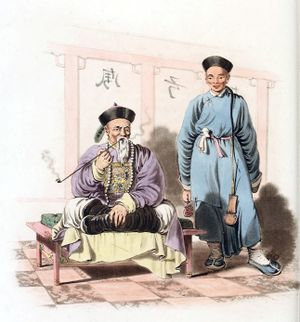
تصحيح الأسماء
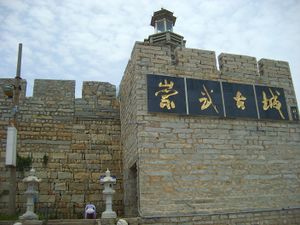
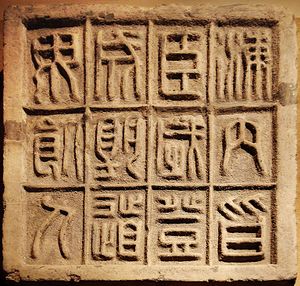
The 12 characters on this slab of floor brick affirm that it is an auspicious moment for the First Emperor to ascend the throne, as the country is united and no men will be dying along the road.
شو أو "التكنيك"
وو وِيْ
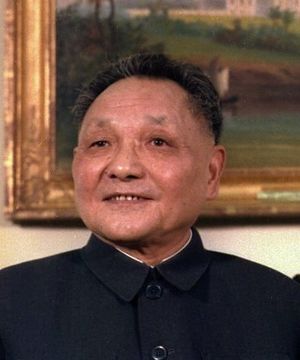
If the ruler's intelligence is display, men will prepare against it; If his lack of intelligence is displayed, they will delude him. If his wisdom is displayed, men will gloss over (their faults); if his lack of wisdom is displayed, they will hide from him. If his lack of desires is displayed, men will spy out his true desires; if his desires are displayed, they will tempt him. Therefore (the intelligent ruler) says 'I cannot know them; it is only by means of non-action that I control them.
— Shen Buhai[11]
شينگ-مينگ، أو الأداء والمنصب
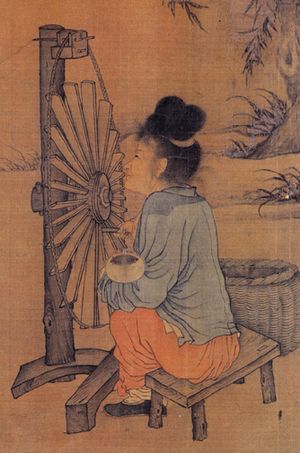
هان فـِيْ
المقبضان

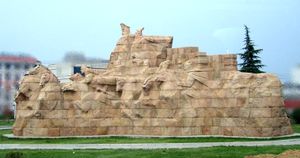
الحكم المطلق المستنير
الصين الامبراطورية
چين و هان
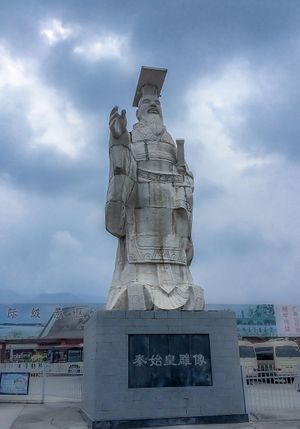
في العصر الحديث
The Yongzheng Emperor of the Qing dynasty was said by a Qing document "Teng Ssu-yu" to "hsun ming tse she(romanization)", or "demand performance in accordance with title", a near-verbatim usage of the Han Feizi.[14]
The Communists would use the Fa-Jia in their criticism of Confucianism, describing the conflict between the two as class struggle.[15] Appeals to the Fa-Jia for solutions became common after the Great Leap Forward. [16] Fazhi, another historical term for "Legalism", would be used to refer to both socialist legality and Western rule of law. Still contrasted with renzhi (or rule of persons), most Chinese wanted to see it implemented in China.[17] Rule of law again gained prominent attention in the 1970s after the Cultural Revolution, in Deng Xiaoping's platform for modernization.
الهامش
- ^ Paul R. Goldin, Persistent Misconceptions about Chinese Legalism. p. 4 http://www.academia.edu/24999390/Persistent_Misconceptions_about_Chinese_Legalism_
- ^ Pines, Yuri, "Legalism in Chinese Philosophy", The Stanford Encyclopedia of Philosophy (Winter 2014 Edition), Edward N. Zalta (ed.), Introduction. http://plato.stanford.edu/archives/win2014/entries/chinese-legalism/
- ^ Jay L. Garfield, William Edelglass 2011, p.59 The Oxford Handbook of World Philosophy https://books.google.com/books?id=I0iMBtaSlHYC&pg=PA59
- ^ Herrlee G. Creel, 1974 p.120. Shen Pu-Hai: A Secular Philosopher of Administration, Journal of Chinese Philosophy Volume 1.
- Zhengyuan Fu, 1996 China's Legalists p.7
- ^ Jacques Gernet 1982 p.92. A History of Chinese Civilization. https://books.google.com/books?id=jqb7L-pKCV8C&pg=PA92
- Pines, Yuri, "Legalism in Chinese Philosophy", The Stanford Encyclopedia of Philosophy (Winter 2014 Edition), Edward N. Zalta (ed.), Epilogue. http://plato.stanford.edu/entries/chinese-legalism/#EpiLegChiHis
- ^ Pines, Yuri, "Legalism in Chinese Philosophy", The Stanford Encyclopedia of Philosophy (Winter 2014 Edition), Edward N. Zalta (ed.), 1. Defining Legalism http://plato.stanford.edu/archives/win2014/entries/chinese-legalism/
- Christopher Hood 1998 p.15, The Art of the State: Culture, Rhetoric, and Public Management. https://books.google.com/books?id=ns7wTyXuw5sC&pg=PA15
- Eileen Tamura 1997 p.54. China: Understanding Its Past, Volume 1. https://books.google.com/books?id=O0TQ_Puz-w8C&pg=PA54
- ^ Pines, Yuri, "Legalism in Chinese Philosophy", The Stanford Encyclopedia of Philosophy (Winter 2014 Edition), Edward N. Zalta (ed.), 2. Philosophical Foundations. http://plato.stanford.edu/entries/chinese-legalism/
- Jay L. Garfield, William Edelglass 2011, p.59,64,66 The Oxford Handbook of World Philosophy https://books.google.com/books?id=I0iMBtaSlHYC&pg=PA59
- Chad Hansen, 1992 p.345 A Daoist Theory of Chinese Thought https://books.google.com/books?id=nzHmobC0ThsC&pg=PA345
- Eileen Tamura 1997 p.54. China: Understanding Its Past, Volume 1. https://books.google.com/books?id=O0TQ_Puz-w8C&pg=PA54
- Peng He 2014. p.85. Chinese Lawmaking: From Non-communicative to Communicative. https://books.google.com/books?id=MXDABAAAQBAJ&pg=PA85
- (R.Eno), 2010 p.1. LEGALISM AND HUANG-LAO THOUGHT Indiana University, Early Chinese Thought [B/E/P374]. http://www.indiana.edu/~p374/Legalism.pdf
- ^ Ross Terril 2003 p.69. The New Chinese Empire. https://books.google.com/books?id=TKowRrrz5BIC&pg=PA69
- ^ http://www.daviddfriedman.com/Academic/Course_Pages/legal_systems_very_different_12/Book_Draft/Systems/ChineseLaw.html
- ^ Deng Xiaoping, EMANCIPATE THE MIND http://en.people.cn/dengxp/vol2/text/b1260.html
- ^ Creel 1970, What Is Taoism?, 66
- ^ Paul R. Goldin 2013. p.10. Introduction: Han Fei and the Han Feizi. https://www.sas.upenn.edu/ealc/system/files/bio/%5Buser-raw%5D/papers/Introduction.pdf
- Chen Qiyou 2000: 2.8.156
- ^ Deng, Yingke and Pingxing Wang. (2005). Ancient Chinese Inventions. 五洲传播出版社. ISBN 7-5085-0837-8. Page 48.
- ^ Creel 1970, What Is Taoism?, 89
- ^ Zhongying Cheng 1991 p.311. New Dimensions of Confucian and Neo-Confucian Philosophy. https://books.google.com/books?id=zIFXyPMI51AC&pg=PA311
- ^ Zhiyu Shi 1993 p.51. China's Just World: The Morality of Chinese Foreign Policy. https://books.google.com/books?id=JNdT5hLPWuIC&pg=PA51
- ^ Karen G. Turner p.1,24. The Limits of the Rule of Law in China. https://books.google.com/books?id=h_kUCgAAQBAJ&pg=PA24
المصادر
- Barbieri-Low, Anthony, trans. The Standard Measure of Shang Yang (344 B.C.) (2006)
- Creel, Herrlee G. (1953), Chinese Thought from Confucius to Mao Tsê-tung, University of Chicago Press, ISBN 978-0-226-12030-0.
- Duyvendak, J.J.L., trans. The Book of Lord Shang: A Classic of the Chinese School of Law. London: Probsthain, 1928.
- Fu, Zhengyuan (1996), China's Legalists: The Earliest Totalitarians and Their Art of Ruling, M.E. Sharpe, ISBN 978-1-56324-779-8.
- Goldin, Paul R. (2011), "Persistent misconceptions about Chinese 'Legalism'", Journal of Chinese Philosophy 38 (1): 88–104, doi:. (preprint) See also
- Graham, A.C., Disputers of the TAO: Philosophical Argument in Ancient China (Open Court 1993). ISBN 0-8126-9087-7
- Lai, Karyn L. (2008), An Introduction to Chinese Philosophy, Cambridge University Press, ISBN 978-1-139-47171-8.
- Pu-hai, Shen. "Appendix C: The Shen Pu-hai Fragments." Shen Pu-hai: A Chinese Political Philosopher of the Fourth Century B.C. Translated by Herrlee G. Creel. Chicago: The University of Chicago Press, 1974.
- Qian, Sima. Records of the Grand Historian, Qin Dynasty. Translated by Burton Watson. New York: Columbia University Press, 1993.
- Schwartz, Benjamin I. (1985), The World of Thought in Ancient China, Cambridge, MA: Harvard University Press, ISBN 978-0-674-96191-3.
- Watson, Burton, trans. Han Fei Tzu: Basic Writings. New York: Columbia University Press, 1964.
- Xinzhong,Yao, Introduction to Confucianism (2000). ISBN 978-0-521-64312-2
- Potter, Pittman, From Leninist Discipline to Socialist Legalism : Peng Zhen on Law and Political Authority in the PRC2 (2003). ISBN 978-0-8047-4500-0
